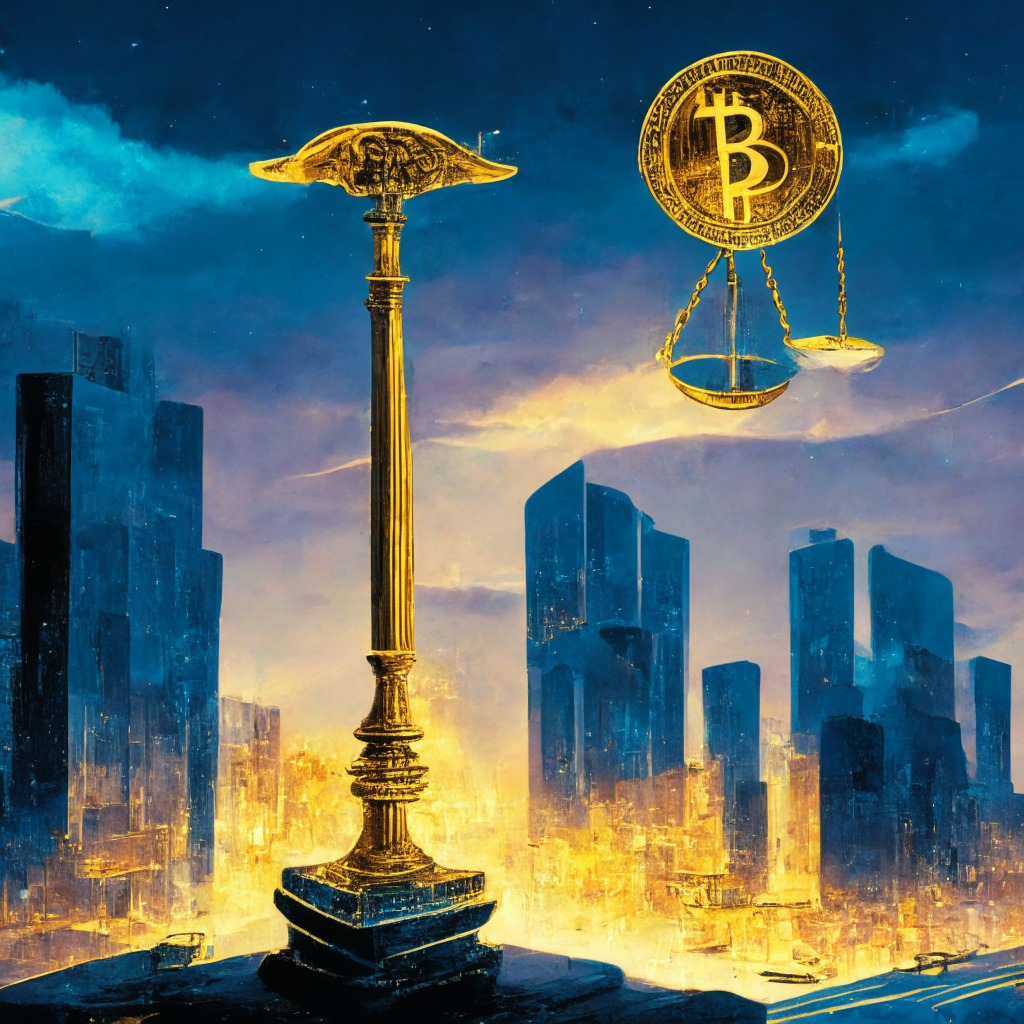Brazil’s Comissão de Valores Mobiliários (CVM) has announced plans to initiate a second regulatory sandbox focusing on tokenization, set to start in 2024. The sandbox will allow companies to test products or ideas under relaxed regulations, potentially in sectors like agribusiness and Environmental, Social, and Governance.
Search Results for: AUD
Unveiling the Crypto Controversy: Accountability Amidst Progress, from Bankman-Fried to Future Prospects
This article discusses the current courtroom drama involving former FTX CEO Sam Bankman-Fried, and the potential societal impact within the cryptocurrency world. It also emphasizes the pressing need for regulatory measures and ethical conduct in crypto companies while highlighting promising investment opportunities in cryptocurrency coins.
Navigating Uncertain Waters: Regulatory Influence in Crypto’s Course and Ripple’s Ongoing Legal Drama
“Highlighted is the critical role of regulation in the crypto industry’s evolution, and its capacity to shape future developments. Ripple’s ongoing legal struggle with the U.S. Securities and Exchange Commission exemplifies high-profile regulatory challenges. The delicate balance between fostering innovation and deterring fraudulent practices underpins the crypto sphere’s future.”
Blockchain Revolution: Promise of Future or Path to Peril?
“Blockchain technology emerges as the future of secure and decentralized transactions with its ability to ensure authenticity and prevent fraud. Despite the vast potential and growth of markets like cryptocurrency, it’s not without risks including anonymity concerns, market volatility, and environmental impact due to its energy-intensive nature.”
China Daily Ventures into NFT: An Ambitious Leap or A Trepid Path?
“China Daily, a CCP-owned newspaper, intends to launch an NFT platform in collaboration with a third-party blockchain firm. With a fund amounting to 2.813 million yuan, the aim is to foster Chinese civilizational influence through tech including Blockchain, AR/VR, NFTs, cloud computing and big data.”
Astrology-themed NFT Scam: Unveiling Blockchain’s Stark Security Challenges
The astrology-themed NFT project, Lucky Star Currency (LSC), has reportedly left with over $1 million, raising serious concerns about the security measures in the blockchain industry. Despite blockchain’s foundational benefits, it’s not invulnerable to manipulative actions, particularly when precautions are ignored. This incident underscores the need for vigilance, research, and due diligence in the crypto space.
Unraveling the Complex Quest for Australia’s Digital Currency: CBDC Exploration and Challenges
The US-based Atlantic Council think tank reported that over half of 130 countries are piloting or launching central bank-issued digital currencies (CBDCs). However, Australia’s journey toward an Aussie digital currency (eAUD) faces complexities, including legal, regulatory, and operational challenges, despite progress made by Blockchain firm Canvas.
Rug Pull Scams in Crypto: Rising Threat or Unavoidable Risk?
“Lucky Star Currency (LSC), a Binance Smart Chain based altcoin token, has reportedly suffered a ‘rug pull’ by its developer, resulting in an estimated loss of $1.11 million and a significant decrease in its value. This event adds to a growing list of similar malicious crypto schemes, affirming reportedly shocking statistics that “12% of all Binance Smart Chain-based tokens are rug pulls.” It highlights the need for investors to exercise caution in the crypto industry.”
Surging Trust Wallet Token and the Exciting Blockchain Casino Evolution
Trust Wallet’s native TWT token has seen a 30% increase due to development activity on the Binance Smart Chain. Despite indications of a possible retracement, TWT exhibits strong momentum ahead of a major release announcement. Meanwhile, TG.Casino, a Telegram-based casino with a strong blockchain ecosystem, is getting attention with a staggering staking APY of 3,446%.
Cloud Mining Revolution: Bitcoin Minetrix Success Amid MineLabCoin Concerns
“Bitcoin Minetrix raked in $822,000 from investors by introducing the concept of tokenizing Bitcoin cloud mining. However, concerns of legitimacy occur as cloud mining has often faced fraudulent incidents. Bitcoin Minetrix’s Ethereum level smart contract handling system offers a safer platform for investors.”
The Bitter Taste of Freedom: Balance Between Market Freedom and Oversight in the Crypto World
“Bankman-Fried’s fraud trial connected to the FTX exchange collapse signifies a flip side to technological advancements in financial markets. The trial highlights the need for a balance between market freedom and regulatory oversight. As blockchain markets mature, increased regulation and oversight is expected.”
Navigating New Waters: First European Film Funded by NFTs Stirs the Cinematic World
‘The Quiet Maid’, the first European feature film funded through NFT sales, represents a new era of blockchain technology in the creative industry. Despite uncertainties surrounding NFTs, this film’s funding model garners worldwide attention. The evolution of blockchain in filmmaking is yet to unfold.
Securing the Fort: How Upbit Thwarts Cyber Intrusions Amid Crypto Boom
“In the first half of 2023, South Korea’s largest cryptocurrency exchange, Upbit, faced a shocking 159,061 attempted intrusions, marking a 1,800% increase from 2020. This surge underlines the need for robust cybersecurity measures, and highlights the value of fortified security for cryptocurrency trading platforms. Despite these challenges, South Korea’s virtual asset market continues to thrive and adapt, providing a valuable blueprint for exchanges worldwide.”
Unraveling Uptober: Navigating the October Crypto Surge Amidst Regulatory Concerns
“Uptober” reflects cryptocurrency’s positive trade in October, based on historic trends. However, potential dangers exist due to the crypto ecosystem’s volatility. Factors such as regulatory progress, major financial institutions’ earnings, and external events can influence market trends, emphasizing the need for investor vigilance and due diligence.
Understanding Blockchain Regulation Through the Lens of High-profile Crypto Cases
“This article discusses the importance of regulations in the blockchain ecosystem, using the case of Sam Bankman-Fried, facing wire fraud allegations for his investment into an AI startup, as an example. The U.S. government’s stance, allegations surrounding OpenSea and the delicate balance between beneficial and restrictive regulations are also discussed.”
Blockchain Technology’s Strength and Weakness: Navigating through Security Risks and Measures
“Despite the secure nature of blockchain technology, recent security breaches, particularly in nonfungible token platforms, have raised skepticism. While safety measures are intensifying, these incidents remind us that blockchain, while a fortress of safety, isn’t entirely immune to manipulation.”
China’s Digital Yuan Giveaway: A Decisive Path to Widespread Crypto Adoption or A Hype Fizzle?
China’s People’s Bank is extensively promoting digital yuan adoption through giveaways, partnerships with e-commerce giants and targetting cross-border trade, tourism, and domestic businesses. English options for digital yuan app aim to entice overseas users, pointing towards the push for global digital currency adoption.
Security Storm Hits Stars Arena: Analyzing the $2.85 Million Avalanche Blockchain Breach
Stars Arena, a platform powered by Avalanche’s Contract Chain, suffered a major security breach leading hackers to successfully takeaway 266,103 AVAX. The aftermath caused the AVAX price to tremble, dropping from $11.56 to $10.78. Securing the platform’s functionality and user funds is now their primary focus.
Bitcoin’s Resistance at $28K: A Market Hurdle or Prelude to a Surge? Plus, The Dark Shadows in Crypto Exchanges
In the Bitcoin market, $28K stands as a significant resistance level that lacks the robust bid needed for conversion to support. Amid global unrest, optimistic forecasts suggest Bitcoin surpassing $30K. Blockchain industry trustworthiness is questioned following allegations of investor fraud against a prominent cryptocurrency exchange’s former CEO. Notably, the crypto world’s decentralized nature doesn’t fully shield it from unscrupulous practices.
The XRP Lawyer vs. FTX CEO Showdown: Debating Accountability and Trust in Cryptocurrency Exchanges
“John Deaton, a prominent XRP lawyer, criticized sympathizers of former FTX CEO Sam Bankman-Fried (SBF) amid speculation of his possible fraud charges. This dispute poses a significant question for crypto enthusiasts: Can crypto exchanges be trusted in the wake of FTX’s bankruptcy and alleged frauds?”
Coercing Cyber Criminals: The Dilemma of Crypto Bounty for Stolen Assets Recovery
“In the evolving blockchain technology landscape, securing crypto platforms against cyber breaches remains a pressing task. Instances like HTX using bounties to recover stolen funds hint at innovative strategies, but also present a dangerous precedent. Persistent advancements in blockchain security are therefore essential.”
Legal Battle-Skies: The Storm Changing Rules for Crypto-Landlords Bankman-Fried and Mashinsky
“The crypto world is currently watching the judiciary battles involving ex-FTX CEO Sam Bankman-Fried and former Celsius CEO Alex Mashinsky, accused of fraud and market manipulation. These trials, against the backdrop of market reshuffle and increasing regulatory pressure, highlight the need for orderly practices and more comprehensive regulation for long-term crypto market sustainability and investor protection.”
Achieving Finality in Blockchain: Irrevocable Transactions, Challenges and Future Prospects
“Finality in blockchain refers to the irrevocable confirmation of a transaction or block of transactions. Achieving finality has challenges like network latency and potential 51% attacks. However, improved security algorithms, consensus algorithms and advanced cryptographic techniques promise faster, more reliable confirmations, and permanence of transactions.”
Hong Kong’s Regulatory Dilemma: The Price of Protecting Crypto Investors
“Hong Kong is taking steps towards limiting retail stablecoin trading among individual investors due to increasing crypto adoption. Stablecoins’ value is pegged to fiat currencies, providing some stability against crypto turbulence. However, the recent TerraUSD stablecoin collapse underscores the need for stringent regulation to ensure investor protection and maintain price stability.”
Elon Musk’s Mission to Transform Twitter into an ‘Everything App’, But What About Crypto?
Elon Musk tested game streaming on ‘everything app’ X, drawing 2.8 million viewers. While X aims to integrate various services, including crypto, it has no clear plan for crypto implementation. To fully embody an ‘everything app’, it must satisfy users seeking decentralized finance.
Billion-Dollar Shockwave: How Bankman-Fried’s Trial Reveals Alameda Research’s Alleged Transgressions
In his trial, former crypto-prodigy Samuel Bankman-Fried faces allegations of misappropriating customer funds and granting “special privileges” to his company, Alameda Research. Gary Wang, cofounder of FTX, claims Alameda received a $65 billion credit line and accumulated $8 billion in debt, accusations not previously disclosed to the public.
Taiwan’s Imminent Crypto Regulatory Bill: Expectations, Challenges, and Impacts on Local Exchanges
“Taiwanese legislators are set to introduce the country’s first cryptocurrency regulatory bill in November 2023, aimed at overseeing cryptocurrency trading and related activities. The law is intended to prevent ‘regulatory arbitrage’ and protect investors from the challenges posed by rising foreign crypto operations.”
The Launchpad XYZ Puzzle: One Platform To Rule Crypto or An Ambitious Overreach?
“Launchpad XYZ, a notable contributor in the cryptocurrency world, has secured $1.85 million in pre-sale funding, planning a robust action plan for 2023. The company aims to provide a comprehensive range of services including educational courses, trading tools, high-level analytics, and an NFT marketplace, acting as an inclusive, all-encompassing web3 ecosystem.”
Exploring the Reasons Behind Solana’s Upswing and Future Challenges in the Blockchain Sphere
The upswing in Solana’s (SOL) price can be attributed to three factors: the recovery following a major court ruling, increased usage of decentralized applications (Dapps) on the Solana network, and a network upgrade. However, competition from Ethereum’s layer-2 solutions and external factors remain challenges.
The Future of Gaming: Exploring Blockchain’s Role in Web3 Gaming’s Meteoric Rise and Challenges
“Web3 gaming, a blend of video gaming and blockchain technology, is revolutionizing the gaming scene with aspects like decentralization, true ownership, and community. Innovations such as play-to-earn, NFTs offer a respite from Web2 monopoly. However, the fast-paced progress of Web3 gaming requires keeping up with promising projects in the blockchain-oriented gaming ecosystem.”
Canadian Securities Administrators Unveil Interim Framework for Stablecoin Issuers: Ensuring Safety or Stifling Creativity?
“The Canadian Securities Administrators (CSA) has unveiled a framework to guide exchanges and issuers of stablecoins, aiming to enhance transparency and trust. The rules require stablecoin issuers to maintain sufficient reserves with a qualified custodian and disclose crucial platform information, underscoring the need for investor information and protection.”
Taiwan’s Upcoming Crypto Legislation: Progressive Regulation or Stifling Clampdown?
Taiwan plans to propose a special law to regulate emerging crypto businesses by November 2023, driven by concerns over offshore markets’ activities. There’s consensus on needing unique legislation for crypto, dissimilar to traditional financial instruments. Taiwan’s Financial Supervisory Commission is helping, releasing guidelines for investors’ protection, including complete segregation between exchange treasuries and customers’ assets. Critics argue that over-regulation might hinder organic growth and innovation.































